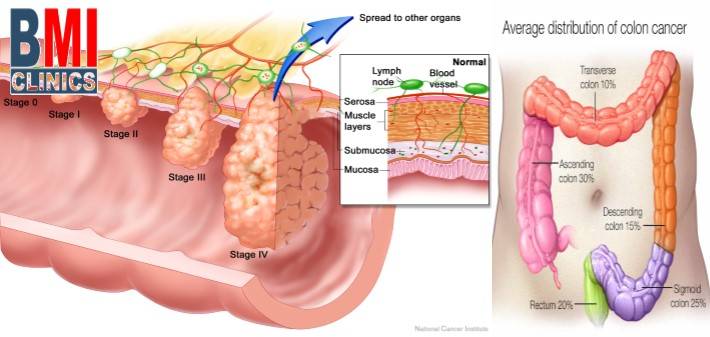Colon cancer is at times referred to as bowel cancer, rectal cancer or colorectal cancer. This kind of cancer affects the large intestine, commonly known as the colon, which is the lowest section of the digestive system.
The majority of colon cancers starts as small, non-cancerous spots known as polyps. After some time, these lumps of cells often become cancerous. Polyps show nearly no symptoms, which regrettably means that this kind of cancer usually goes unnoticed until it reaches more advanced stages. The most common symptoms of colon cancer include blood in the stools, fatigue, or weakness, unexplained weight loss, a feeling of being bloated, even after taking a small meal, abdominal pain or discomfort that does not disappear, and a feeling that their system is not ‘clean’.
Though the exact cause of colon cancer is yet to be known, there are several factors which are well known for raising an individual’s risk of developing this kind of cancer. Some of the common risk factors include radiotherapy, aging, inflammation in the intestines, diabetes, and family history. While some risk factors are out of our control (age for instance), others are entirely within our control.
We shall look at 6 ways on how to reduce your risk of colon cancer.
1. Engage Regularly in Physical Exercises
One of the leading cause of colon cancer is sedentary lifestyle. The Journal of the National Cancer Institute printed a study in 2014, which showed that sedentary lifestyle was closely linked to an increased risk of various types of cancer, including colon cancer, and lung cancer to mention a few. Engaging in moderate, regular exercise is one of the best ways to improve your overall health. In case you have been dormant for some time, you can easily get back into the exercise habit by beginning gradually. Choose activities that you love so that you will be able to stick to your exercise program.
2. Take Dairy Products
Drinking milk regularly can have a shielding effect when it comes to the fight against colorectal cancer. Studies have shown that having a diet which is high in calcium, and particularly milk is connected with a lower risk of colon cancer. Additional research shows that the best protection from colon cancer is milk and dairy products, for instance, yogurt.
3. Stop smoking
In case you are a heavy smoker, then you are already aware of the risks involved with it as far as lung cancer is concerned. Many smokers, however, do not know that when they smoke, it increases their risk of developing colon cancer. Smoking also increases the risk of esophageal cancer and stomach cancer. In case you have tried quitting and failed, do not give up. Many smokers try 6-7 times before they finally succeed and abandon the habit.
4. Vitamin D
Vitamin D is usually referred to as sunshine vitamin. Human bodies turn the sunshine into vitamin D. getting 20-30 minutes of sunshine daily can prevent the insufficiency of Vitamin D in the body and thus help in reducing the risk of different kinds of cancer including colon cancer. The journal Cancer Epidemiology, Bio-markers, and Prevention printed a systematic and meta-analysis review with studies that were done on colon cancer and they discovered that low levels of Vitamin D were connected to higher risks of this kind of cancer.
Vitamin D is essential to the body for cell growth regulation, which might be why this essential vitamin is so significant for the prevention of cancer. On those days when you cannot get sunshine, take more foods that are rich in vitamin D such as fish, cod liver oil, and eggs.
5. Colon cancer and antibiotics
Though at times antibiotics can be lifesavers, many people today take them for very sniffle and cough. Research has shown that taking excessive amounts of antibiotics can significantly increase the risk of one developing different types of cancer including lung, breast, colon, and prostate cancer.
Scientists believe that the excessive antibiotics that is used weakens the immune system by killing any bacteria in the body, even the type that the body needs. Do not attempt to take any antibiotics unless you are directed to do so by a doctor. You should look for alternative ways to fight infections and use antibiotics only for life-threatening cases.
6. Limit Your Alcohol Intake
Limiting alcohol consumption is one of the best ways of reducing your risk to colon cancer. Excessive alcohol intake is connected with higher rates of breast, colon, liver, larynx, and throat cancer. When alcohol is consumed in excess, it destroys the tissues and results in changes in the DNA at the cellular level that slowly results to cancer.









